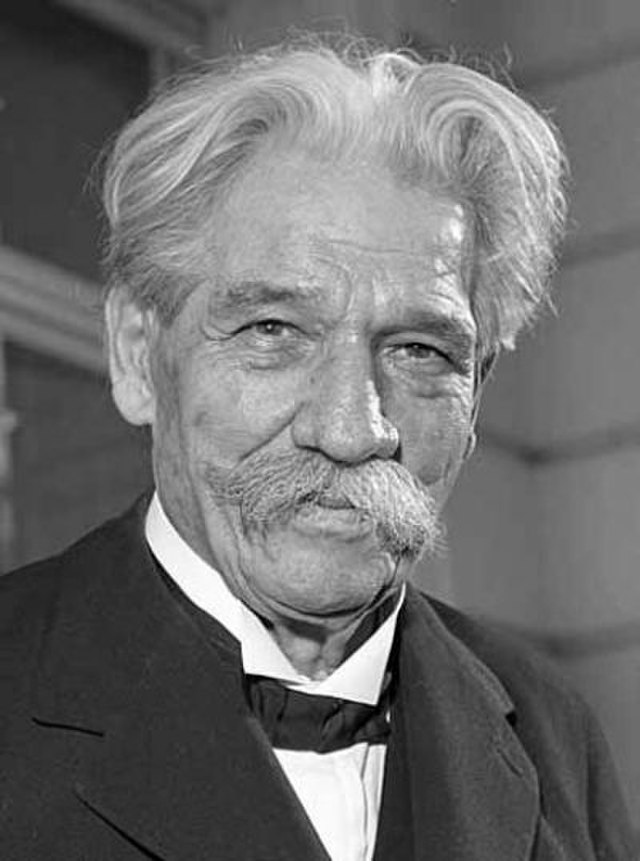
At a Church Council retreat in the fall of 2022, we played a dating game where we asked our rotating partners, “Who are the heroes you look up to?” The answer that came to me immediately is Albert Schweitzer. I was disappointed when few people recognized that name, but it should not have been a surprise. Schweitzer was awarded the Nobel Peace Prize in 1952, and that seems like ancient history to many.
But this remarkably talented man—both a musician and a medic—was the hero of my childhood. Why? He spent the first 30 years of his life focusing on music, while dedicating his remaining decades to healing the ill and injured on the continent of Africa. Schweitzer loved animals, revered life in all its forms, and went out of his way to avoid hurting or killing any living being.
In a recent Salt Project Almanac, Schweitzer and his wife Helene are remembered:
January 14 is the birthday of theologian, musician, and humanitarian Albert Schweitzer, born in Kaysersberg, in present-day France, in 1875. A musical prodigy and expert on Bach, Schweitzer decided at the age of 21 to spend his twenties devoted to music, art, science, and religion — and then, at the age of 30, to devote the rest of life to humanitarian work. On his 30th birthday, he resolved to become a medical missionary, and enrolled in medical school. His wife, Helene, earned a nursing degree, and the couple eventually relocated to West Africa, where they set up a hospital in Lambaréné, in present-day Gabon — funding the construction with money Schweitzer had saved from giving organ concerts. They conceived this work not as charity but as a small gesture of reparations for the evils of European colonialism. Along the way, Schweitzer also published two influential theological books, one on the search for “the historical Jesus,” and one on the Apostle Paul, arguing that mystical union with Christ, not “justification by faith,” is actually Paul’s central idea.
The hospital in Lambaréné was rustic, with no phones or radios, and most work being done by the light of kerosene lamps. Schweitzer’s compassion extended to all God’s creatures: he was a committed vegetarian, even refusing to kill insects. Animals were allowed to roam freely on the hospital grounds, and famously, a hippo once wandered into the vegetable garden.
In 1952, nearly 40 years after he and Helene had set out for Lambaréné, Schweitzer was awarded the Nobel Peace Prize, both for his humanitarian work and his philosophy/theology of what he called “Reverence for Life.” The Schweitzers used the prize money to expand the hospital, adding a treatment center and housing for people with leprosy. Schweitzer’s Nobel lecture, entitled “The Problem of Peace,” is today considered one of the finest speeches of the twentieth century. It includes these lines: “What really matters is that we should all of us realize that we are guilty of inhumanity. The horror of this realization should shake us out of our lethargy so that we can direct our hopes and our intentions to the coming of an era in which war will have no place.” In his remaining years, Schweitzer campaigned against nuclear weapons and foreign interference in the Congo (today known as the Democratic Republic of the Congo).
Who are the heroes you admire? Are they presidents or preachers, humanitarians or CEOs, teachers or athletes? I believe we can find heroes among all those groups of people. Jesus welcomed the tax collector, after all, even though that man was no doubt reviled in the community. Jesus recognized the marginalized again and again in his ministry on Earth.
Not all my heroes are as renowned as Albert Schweitzer. Anyone who shelters abandoned pets, people great and small who work for justice, Greta Thunberg, Dr. Paul Farmer (he’s now deceased, but his story lives on in Tracy Kidder’s book Mountains Beyond Mountains), parents instilling important values in their children even if they struggle to put food on the table, Melinda Gates, Betty White, and many more. Heroes can inspire us to live our best lives and to reach to become the person that God wants us to be.
Carol Harker
St. Andrew Member & Parish Manager

